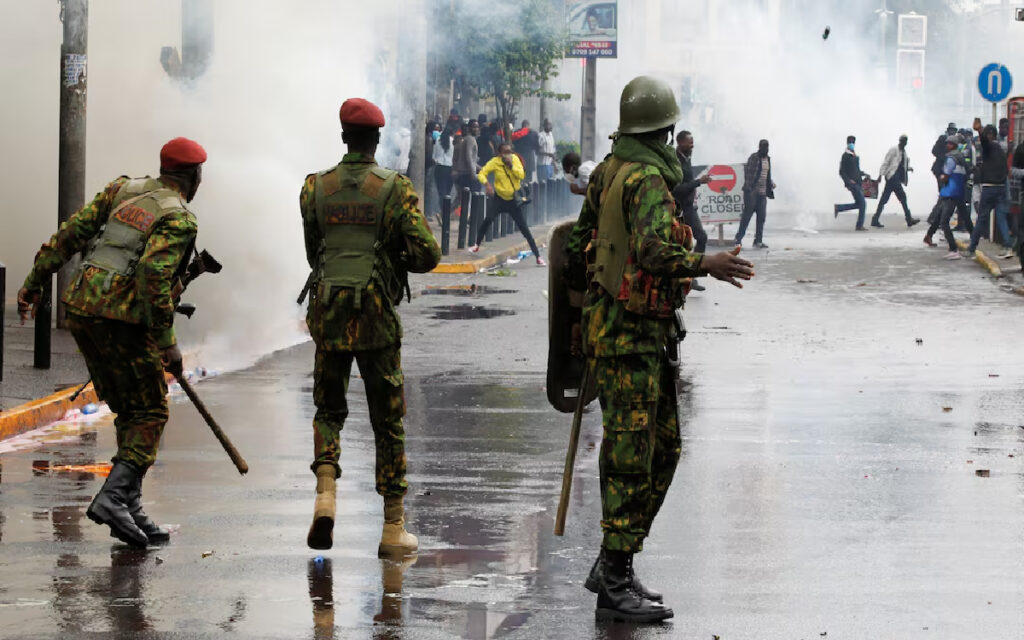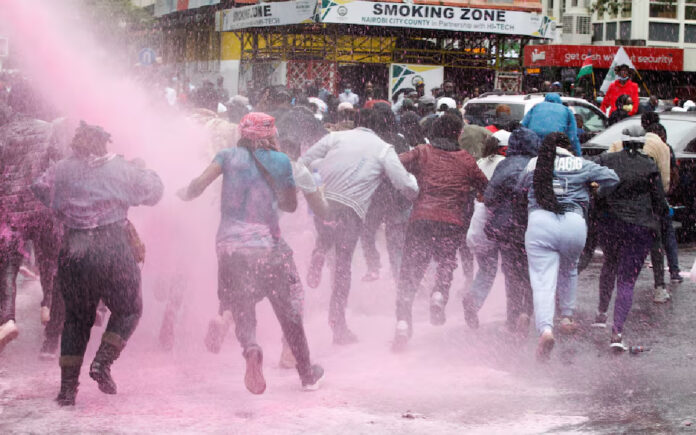Nairobi: Riot police in Nairobi clashed with thousands of demonstrators on Thursday, using tear gas and water cannons to disperse crowds protesting government plans to implement $2.7 billion in new taxes across Kenya. The protests, occurring simultaneously in various locations, aimed to oppose the proposed tax hikes, which are part of efforts to address the country’s budget deficit.
During the late stages of the demonstration near State House, the official residence of President William Ruto, tear gas was deployed to scatter protesters marching along a major road. Earlier in the day, authorities had used purple-colored water from water cannons to clear demonstrators from Nairobi’s central business district and block their access to parliament, where the protest had begun peacefully.
According to the Kenya Red Cross, 39 individuals were treated for injuries sustained during the protests, with eight reported to be in critical condition.

Police spokesperson Resila Onyango and Nairobi police commander Adamson Bungei did not provide any comments despite requests.
In a statement, Police Inspector General Japhet Koome emphasized that disruptions to parliamentary proceedings or occupation of key government facilities would not be tolerated.
Protesters argue that the tax increases will adversely affect the economy and exacerbate the financial burden on Kenyans already struggling to meet their basic needs.
“We are fighting for our future rights,” said Theru Nderitu, a student participating in the protest, speaking to Reuters in Nairobi. “Right now, we are not paying taxes, but we are here for our future.”
Acknowledging public discontent, a parliamentary panel recommended the removal of several proposed taxes from the finance bill, including levies on car ownership, bread, cooking oil, and financial transactions. However, the panel also proposed an increase in the fuel tax allocated for road maintenance.
President Ruto, who campaigned on promises to assist Kenya’s working poor, defended the need for tax hikes to reduce the government’s reliance on borrowing. He endorsed the parliamentary panel’s recommendations to revise the tax proposals.
Also Read | Madonna Fans Withdraw Lawsuit Over Late Concerts; Legal Threats Loom
In various towns including Nyeri, Nakuru, Eldoret, Isiolo, Mombasa, and Kisumu, demonstrators staged peaceful protests demanding lawmakers reject the bill. They held placards denouncing “economic dictatorship” and chanting slogans calling for political change.
Elsewhere in Eldoret, police dispersed demonstrators in the afternoon.
The International Monetary Fund has urged the Kenyan government to increase revenues in its upcoming budget to alleviate the need for extensive borrowing.
As parliament debated the bill on Thursday, lawmakers aligned with Ruto’s coalition expressed mixed views despite his majority. Kimani Ichung’wah, the parliament’s majority leader, announced plans for a vote on proposed amendments to the bill next Tuesday.
Ndindi Nyoro, chair of the parliament’s budget committee, indicated that scrapping the proposed tax increases could result in a budget shortfall of 200 billion Kenyan shillings ($1.56 billion) in the 2024/25 fiscal year, necessitating corresponding spending cuts.



